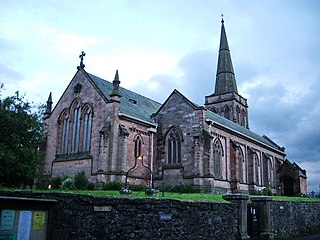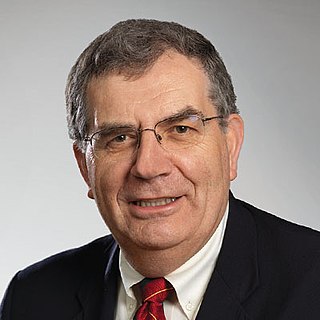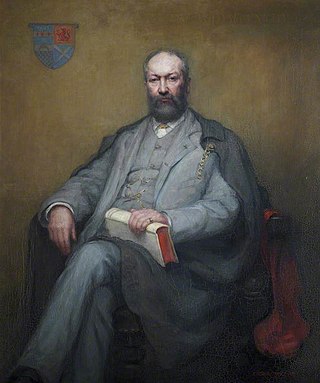Related Research Articles

Henry Duncan FRSE was a Scottish minister, geologist and social reformer. The minister of Ruthwell in Dumfriesshire, he founded the world's first mutual savings bank that would eventually form part of the Trustee Savings Bank. He served as Moderator of the General Assembly of the Church of Scotland in 1839. At the Disruption has left the Church of Scotland and sided with the Free Church. He was also a publisher, a philanthropist and an author, writing novels as well as works of science and religion.

Albert Benjamin Simpson, also known as A. B. Simpson, was a Canadian preacher, theologian, author, and founder of the Christian and Missionary Alliance (C&MA), an evangelical denomination with an emphasis on global evangelism that has been characterized as being Keswickian in theology.

The Higher Life movement, also known as deeper Christian life, the Keswick movement or Keswickianism, is a Protestant theological tradition within evangelical Christianity that espouses a distinct teaching on the doctrine of entire sanctification.

The Keswick Convention is an annual gathering of conservative evangelical Christians in Keswick, in the English county of Cumbria.

Sinclair Buchanan Ferguson is a Scottish theologian known in Reformed Christian circles for his teaching, writing, and editorial work. He has been Chancellor's Professor of Systematic Theology at Reformed Theological Seminary since 2017, commuting from Scotland, where he was an assistant minister at St. Peter's Free Church of Scotland, Dundee. He is currently a preaching associate at Trinity Church, Aberdeen.
Duncan Campbell was a Scottish Evangelist, who is best known for being a leader in the Lewis Awakening or Hebrides Revival, a mid-20th century religious revival in the Scottish Hebrides.
James Aitken Whyte was a Scottish theologian, presbyterian minister, and academic. He served as Moderator of the General Assembly of the Church of Scotland from 1988 to 1989.

Arthur Tappan Pierson was an American Presbyterian pastor, Christian leader, missionary and writer who preached over 13,000 sermons, wrote over fifty books, and gave Bible lectures as part of a transatlantic preaching ministry that made him famous in Scotland, England, and Korea. He was a consulting editor for the original "Scofield Reference Bible" (1909) for his friend, C. I. Scofield and was also a friend of D. L. Moody, George Müller, Adoniram Judson Gordon, and C. H. Spurgeon, whom he succeeded in the pulpit of the Metropolitan Tabernacle, London, from 1891 to 1893. Throughout his career, Pierson filled several pulpit positions around the world as an urban pastor who cared passionately for the poor.
The Free Church of Scotland is a conservative evangelical Calvinist denomination in Scotland. It is the continuation of the original Free Church of Scotland that remained outside the union with the United Presbyterian Church of Scotland in 1900, and remains a distinct Presbyterian denomination in Scotland.

The St George's Tron Church, in Glasgow, Scotland, is a Church of Scotland church in the city centre, located in Nelson Mandela Place, previously known as St George's Place, fronting Buchanan Street at West George Street, along from Queen Street Station. It should not be confused with the 17th-century Tron Church, which lies to the south-west on Trongate and was redeveloped in the 1980s as the Tron Theatre. Located right on the busiest shopping street in Scotland, the building is a significant presence, and the oldest in the area. It stands as a terminating vista for West George Street.

William Angus Knight was a Scottish Free Church minister and author and Professor of Moral Philosophy at St Andrews University. He created the Lady Literate in Arts qualification.
George Duncan may refer to:
David Jackman is a British evangelical speaker, and former president of The Proclamation Trust. He founded the Cornhill Training Course in 1991 and was previously Minister of Above Bar Church, Southampton from 1976 to 1991.
Richard Charles Lucas is an Anglican evangelical cleric, best known for his long ministry at St Helen's Bishopsgate in London, England, and for his work as founder of the Proclamation Trust and the Cornhill Training Course.

Jessie Penn-Lewis was a Welsh evangelical speaker, who wrote several Christian evangelical works. Her religious work took her to Russia, Scandinavia, Canada, the United States and India.
John MacNeil, was a Presbyterian author and evangelist in Australia. He is best known for his 1894 book, The Spirit-Filled Life.
Robert Fleming the elder was a Scottish Presbyterian Minister. Following the Restoration of King Charles II, he declined to accept the authority of the newly imposed bishops in the Kirk. He was therefore ejected as minister at Cambuslang. For the next ten years he remained in Scotland, preaching as he had opportunity. In 1669 he published the first part of Fulfilling of the Scripture in Rotterdam; it was later expanded to 3 parts and it is for this work and other treatises that Fleming is chiefly remembered. On 3 September 1672 he declined indulgence at Kilwinning, disobeyed a citation of the Privy Council, and fled to London, where his Scottish speech somewhat marred his usefulness. On 30 December 1677 he was admitted colleague to John Hog, minister of the Scots Kirk, Rotterdam. After the Revolution he might have been restored to Cambuslang, but preferred to remain in Holland. While on a visit to London, he died of fever, 25 July 1694, after a short illness. Daniel Burgess preached at his funeral and also recorded some memoirs of Fleming's life.
Philip Henry Hacking is a retired Anglican priest, itinerant evangelical speaker, Bible teacher and occasional author.
Events from the year 1800 in Scotland.
References
- Preface to God so Loves... (Worthing, 1970), a booklet based on a series of BBC broadcast talks.